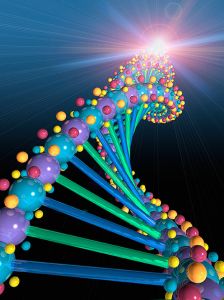 According to a new study, the spread of religion is caused by a gene shared by religious believers. The study also suggests that, in combination with this gene, the spread of religion is also caused by higher reproduction rates among religious people. What are the implications of such a discovery? Does it mean that religious belief or spiritual devotion are reducible to biological evolution?
According to a new study, the spread of religion is caused by a gene shared by religious believers. The study also suggests that, in combination with this gene, the spread of religion is also caused by higher reproduction rates among religious people. What are the implications of such a discovery? Does it mean that religious belief or spiritual devotion are reducible to biological evolution?
The study was conducted by Cambridge University economics professor Robert Rowthorn and published in Proceedings of the Royal Society B, a prestigious journal of the Royal Society of London for Improving Natural Knowledge, or simply the Royal Society, a consortium of scientists.
In support of his theory about a "predisposition toward religion", Rowthorn notes the findings of the World Values Survey taken in eighty-two countries from 1984 to 2001. According to these findings, which covered a diverse range of faith groups and world religions, people who attended religious services more often than once a week had an average of 2.5 children, whereas those who never attended religious services had only 1.67 children. Rowthorn sums up the findings by saying, "[t]he more devout people are, the more children they are likely to have."
This high reproduction rate among the religious works in tandem with a gene, Rowthorn believes, to spread religion across the globe. Not only are people who believe in a higher power or divine creator likely to breed more, but they also possess a genetic predisposition toward holding such beliefs. Rowthorn calls this predisposition a "genetic endowment". A higher breeding rate among the religious, coupled with the passing of this gene on to their children who outnumber those of the non-religious could explain why most of the world's people are religious.
One example Rowthorn gives of a religious community showing explosive growth is the Old Order Amish community in the northeastern United States. This community more than doubled its population, growing from 123,000 in 1991 to 249,000 in 2004. However, such growth could have been much greater if it were not for the fact that many children still choose to leave their childhood religion behind. Since such children are believed to carry this "believer's gene", they tend to breed less, and thereby slow the spread of this gene, when they abandon entrenched religious doctrine and practice. Despite this "setback" to the gene's spread, Rowthorn argues, the genetic predisposition remains extremely vigorous and should, in the end, predominate.
What does all of this mean about the purpose of religious faith? Could it be that religious faith is some sort of attempt to explain natural phenomena among primitive peoples, and that modern man clings to this behavior? Not necessarily, says Christian apologist Dinesh D'Souza in his book Life after Death: the Evidence. Anthropologists, he explains, reject the notion that primitive man created religion as a means to explain nature, because primitive man did not necessarily possess the propensity to explain nature analytically in the way that modern man does. By suggesting that primitive man did, he says, modern man is anachronistically projecting his modern mindset onto the thought habits of past societies (pp. 40-1).
It will be interesting to find out if Rowthorn's theory is correct, and if there really is a code in some people's DNA that makes them more religious. More valuable than this, however, would be an answer to the question why such a gene exists, if it does. What would be its purpose? Is it a helpful gene, or is it an archaic relic which causes more harm than good in modern society? Give us your thoughts on the issue by visiting our Facebook discussion page or our social network for ministers ordained online.
Source:


0 comments